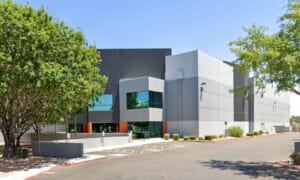Every year, the Arizona Association for Economic Development fields nominations for individuals and organizations that have a significant impact on a city, a community and the state. These Economic Development Distinguished by Excellence (EDDE) awards are a tough-earn and a new year doesn’t always guarantee a winner; the “Best of Arizona” has only been awarded six times in the last two decades. This year’s awardees were recognized at AAED’s Spring Conference in Tucson, Ariz. on May 2.
Economic Developer of the Year
William Jabjiniak
Economic Development Director, City of Mesa
 As Economic Development Director at the City of Mesa, Bill Jabjiniak leads a team of 14 professionals focused on business attraction, retention and expansion, workforce development and revitalization. He has focused on the City of Mesa’s Healthcare, Education, Aerospace/Aviation and Technology/Tourism (HEAT) program in order to attract businesses and create quality jobs in Mesa.
As Economic Development Director at the City of Mesa, Bill Jabjiniak leads a team of 14 professionals focused on business attraction, retention and expansion, workforce development and revitalization. He has focused on the City of Mesa’s Healthcare, Education, Aerospace/Aviation and Technology/Tourism (HEAT) program in order to attract businesses and create quality jobs in Mesa.
In the past seven years, the Office of Economic Development (OED) attracted, expanded or assisted in 134 projects. In the last two years, the OED created and retained more than 3,600 jobs and generated nearly $2B of capital investment in Mesa.
The largest economic development was the attraction of Apple, Inc. This will be one of the first U.S. manufacturing facilities for Apple, which will result in 700 full-time jobs, 1,300 construction jobs and $1.5B in new capital investment for Mesa. Some other technology developments include Able Engineering, Bridgestone Corporation, Matheson Tri-Gas, Arizona Laboratories for Security and Defense and Launchpoint. These other companies will result in hundreds of jobs with average salaries above $50,000 and millions of dollars invested.
For education, Mesa attracted five new higher education institutions that created 44 new full-time jobs and contributed more than $6.5M in private investment to the city.
For tourism, Mesa houses two spring training baseball teams with new and updated stadiums. The Cubs Stadium Complex is estimated to bring $138M annually to Arizona. Mesa announced a 20-year agreement with the Oakland Athletics at a $28M newly renovated Hohokam Stadium.
Jabjiniak holds a master’s degree in Community Economic Development and a MBA from Southern New Hampshire University, works with the Economic Development Advisory Board, city management and City Council to protect areas that offer significant potential for economic growth as employment centers. He also leads as a voice of the region on policy issues and regional collaboration as a member of several local, regional and national boards. He participates in more than a dozen forums on economic development including AAED, Urban Land Institute, Valley Partnership, CoreNet and IEDC.
Economic Developer of the Year, Small Community
Mignonne Hollis
Executive Director, Sierra Vista Economic Development Foundation
 As Executive Director of the Sierra Vista Economic Development Foundation (SVEDF), Mignonne Hollis received the 2013 Governor’s Excellence in Economic Development Award. The award recognized SVEDF for The Business Complex, which includes a 4,300 SF co-working facility that provides workspaces and resources to entrepreneurs. Eleven startups have utilized the facility and resources. Two of those businesses grew enough to move into another space, three businesses hired additional staff and four businesses expanded or relocated to Sierra Vista.
As Executive Director of the Sierra Vista Economic Development Foundation (SVEDF), Mignonne Hollis received the 2013 Governor’s Excellence in Economic Development Award. The award recognized SVEDF for The Business Complex, which includes a 4,300 SF co-working facility that provides workspaces and resources to entrepreneurs. Eleven startups have utilized the facility and resources. Two of those businesses grew enough to move into another space, three businesses hired additional staff and four businesses expanded or relocated to Sierra Vista.
Hollis supported development and expansion of the Unmanned Aircraft Systems (UAS) industry by creating a private UAS test site when Arizona failed to receive the FAA national test site designation. More than 100 testing hours of airspace are committed, and $250,000 of facilities construction are planned.
Hollis collaborates within the UAS industry as an appointee to the Greater Arizona Development Authority. She serves as President of the AZTRC UAS Industry Consortium and was nominated to be treasurer of the local Association for Unmanned Vehicles System International. She is on the IEDC’s Public Policy Advisory Board, which allows her to monitor and review the legislative affairs and federal relations by providing a list of legislative issues, recommending strategic and policy actions and providing guidance for the Economic Development Summit.
Hollis completed the requirements for the CEcD and plans to take the exam in December. She participates in the AAED Southern Arizona Membership Committee and helped form the southeastern Regional Economic Development Group, which brings synergy to the economic development efforts of Cochise County communities.
New Member of the Year
Marcelino Flores
Council Member, Pascua Yaqui
 During his first year as an AAED member, Marcelino Flores recruited three new members and worked with the Southern Arizona Membership Committee and Casino Del Sol in organizing the Southern Arizona Luncheon.
During his first year as an AAED member, Marcelino Flores recruited three new members and worked with the Southern Arizona Membership Committee and Casino Del Sol in organizing the Southern Arizona Luncheon.
Flores embodies the three AAED organization pillars of education, advocacy and collaboration. As a pivotal contributor in organizing a tribal visit for AAED’s Tribal Economic Development Committee, Flores showed his belief in helping Arizona tribes strengthen their relationships with the state and local municipalities. The luncheon occurred during the Pascua Yaqui Tribe’s Annual Recognition Day, which provided AAED members an opportunity to learn about the challenges the tribe encountered in establishing federal recognition. Members had an opportunity to meet with other council members and speak with Tribal Chairman Peter Yucupicio and historian David Ramirez.
Flores participates in Maricopa Association of Governments (MAG) and Pima Association of Governments (PAG). He is an active member of AAED’s Tribal Economic Development Committee and has attended a multitude of AAED functions. He is involved in other community and professional organizations such as the Metro Chamber of Commerce, Tucson Regional Economic Opportunity, Hispanic Chamber of Commerce, Imagine Greater Tucson, Pima Association of Governments and Nineteen Tribal Nations Workforce Investment Board.
Workforce Practitioner of the Year
Richmond Vincent
Chairman & CEO, Goodwill of Central Arizona
 Richmond Vincent’s vision is to eliminate unemployment in Arizona. He led Central Arizona’s division in setting new records in people served and job placements achieved, 66 percent and 88 percent respectively, which resulted in an economic impact of $734M. His team provided job training and employment placement services to 60,000 Arizonans, filled 23,500 local jobs and raised $500,000 in new revenue.
Richmond Vincent’s vision is to eliminate unemployment in Arizona. He led Central Arizona’s division in setting new records in people served and job placements achieved, 66 percent and 88 percent respectively, which resulted in an economic impact of $734M. His team provided job training and employment placement services to 60,000 Arizonans, filled 23,500 local jobs and raised $500,000 in new revenue.
Vincent helped develop and implement programs to improve job seeker employability such as the Computer and Customer Service Training program. Vincent’s team partnered with local employers to develop a curriculum with vocational training in career preparation, human relations and basic computer skills. Five-hundred and seventy-eight individuals attended and 73 percent achieved job placement.
His team opened five new Goodwill Career Centers and hosted its first Goodwill Career Expo, bringing 150 employers hiring for nearly 7,000 open positions. More than 6,000 people attended, leading it to be one of the largest hiring events ever held by Goodwill. Goodwill of Central Arizona is No. 1 in job placements in the organization.
Large Organization of the Year
City of Mesa, Office of Economic Development

The City of Mesa invests in increasing the number of its staff joining AAED each year. Staff members participated in more than 22 trainings, classes, luncheons, conferences and events, including the IEDC Annual Conference, ICMA conference and training session, NBIA Incubator Management Training Program and GPEC training seminar.
The City of Mesa OED sponsored and hosted two AAED exclusive events: the Legislative Luncheon and the AAED Business 2 Baseball day at Cubs Park.
It partnered with the Neighborhood Economic Development Corporation and the Sustainable Communities Consortium to host Mesa’s Urban Redevelopment Summit. More than 100 members attended and were instructed on topics such as emerging urban markets, community banks, the value of walkability in real estate investments and sustainable communities to spur redevelopment opportunities in the community.
Mesa collaborates with neighboring cities and public-private partnerships to create jobs, capital investment and education in the area. It opened five new colleges and universities, began offering 25 full-time undergraduate programs and launched the Mesa Educates U campaign. One major project includes the Phoenix-Mesa Gateway Airport that was crucial in keeping Able Engineering in Arizona.
Small Organization of the Year
Verde Valley Regional Economic Organization, Inc.
 Verde Valley Regional Economic Organization (VVREO) strongly supports AAED and economic development in Arizona. Many of the members of the Board of Directors have been active in AAED activities and committees. VVREO also sponsored a speaker series featuring the “BoomTown USA’s Millenials: Supercharged Entrepreneurs” presentation. VVREO secured sponsors for several high school seniors and recent graduates to attend, which helped spark on-campus entrepreneurial clubs at Red Rocks High School and on the Yavapai-Apache Nation Reservation. Many members work with regional teams, such as the Yavapai County Sector Strategy Team, that focus on industry collaboration to grow the economic sectors of medical technology, precision manufacturing, renewable energy and viticulture. VVREO served as an incubator for the Verde Valley Wine Consortium, the regional wine industry trade association and the Verde Valley Agriculture Coalition and is working to establish a major food hub for the area.
Verde Valley Regional Economic Organization (VVREO) strongly supports AAED and economic development in Arizona. Many of the members of the Board of Directors have been active in AAED activities and committees. VVREO also sponsored a speaker series featuring the “BoomTown USA’s Millenials: Supercharged Entrepreneurs” presentation. VVREO secured sponsors for several high school seniors and recent graduates to attend, which helped spark on-campus entrepreneurial clubs at Red Rocks High School and on the Yavapai-Apache Nation Reservation. Many members work with regional teams, such as the Yavapai County Sector Strategy Team, that focus on industry collaboration to grow the economic sectors of medical technology, precision manufacturing, renewable energy and viticulture. VVREO served as an incubator for the Verde Valley Wine Consortium, the regional wine industry trade association and the Verde Valley Agriculture Coalition and is working to establish a major food hub for the area.
Another regional project focus is the completion of Highway 260, which will provide access to the Verde Valley from I-17. Numerous VVREO Directors worked with the regional committee and testified before the ADOT Board of Directors, obtaining $66M commitment to complete the highway.
William Lampkin Award
Brian Dalke
 As the first Economic Development Director and Deputy City Manager for the City of Goodyear, Brian Dalke has contributed significant growth in economic development. It’s only appropriate that he also wins one of the most prestigious EDDE awards this year. According to the latest census, when Dalke started in 1994 the city had 10,473 citizens and by the time he left in 2004, the city had grown to more than 40,000 residents. Dalke has contributed to the economic development of Goodyear as a lead negotiator for Goodyear’s Development Agreement with Westcor for its 1.2 MSF regional mall, negotiated $55M improvements of infrastructure, recruited the Cleveland Indians and Cincinnati Reds Spring Training baseball stadiums, facilitated key locates with major corporations and negotiated with Cancer Treatment Centers of America, which created more than 650 jobs and $150M in capital investment.
As the first Economic Development Director and Deputy City Manager for the City of Goodyear, Brian Dalke has contributed significant growth in economic development. It’s only appropriate that he also wins one of the most prestigious EDDE awards this year. According to the latest census, when Dalke started in 1994 the city had 10,473 citizens and by the time he left in 2004, the city had grown to more than 40,000 residents. Dalke has contributed to the economic development of Goodyear as a lead negotiator for Goodyear’s Development Agreement with Westcor for its 1.2 MSF regional mall, negotiated $55M improvements of infrastructure, recruited the Cleveland Indians and Cincinnati Reds Spring Training baseball stadiums, facilitated key locates with major corporations and negotiated with Cancer Treatment Centers of America, which created more than 650 jobs and $150M in capital investment.
Dalke has affected AAED as a member and president. He coordinated the search and interview process for the association’s director in 2011, helped the AAED take on the Arizona Basic Economic Development Course from the University of Arizona in 2012, and for the past two years has taught the Economic Development Finance module for the course. As a constant supporter of Luke Air Force Base, Dalke has ensured that the city updated its general plan, limiting the encroachment of housing and helped bring the F-35 to the state. He also strongly supported the Greater Phoenix Economic Development Council, which brought many corporations to Goodyear.
Best of Arizona
Arizona State University
 It’s all in the name. This award, last given to Arizona Tourism and Sports Authority in 2008 and to IGC/TGen in 2003, is one of the least frequently awarded by AAED. Since 1996, five entities have been named “Best of Arizona,” an award that recognizes statewide contributions to economic development. Over the last decade, Arizona State University has developed a New American University with which the school assumes responsibility for the economic, social and cultural vitality of the communities that surround it.
It’s all in the name. This award, last given to Arizona Tourism and Sports Authority in 2008 and to IGC/TGen in 2003, is one of the least frequently awarded by AAED. Since 1996, five entities have been named “Best of Arizona,” an award that recognizes statewide contributions to economic development. Over the last decade, Arizona State University has developed a New American University with which the school assumes responsibility for the economic, social and cultural vitality of the communities that surround it.
Since 2001, ASU has grown its classroom, lab, library, residential spaces by more than 76 percent.
ASU is the seventh largest employer in Arizona with a payroll of $910M. The University was responsible for $275M in labor income and consumer spending by staff, students and visitors supported an estimated $422M. Each ASU football game also raised $9.4M for Tempe. It’s estimated that out-of-towners spend 230,000 visitor-days in Phoenix because of University-related activities.
The University also plays a role in business retention and expansion, from the General Motors Innovation Center to GoDaddy Global Technology Center at ASU’s Research Park.
Outside of Arizona, ASU is making an impact on other institutions looking for a working model by which to shape their New American University program. ASU President Michael Crow fielded a few questions about the university’s progress and its effect on Arizona.
This is actually the second time ASU has won an EDDE. The first was in 2001, when it recognized the ASU Research Park. This year’s award is largely due to ASU’s adoption of the New American University. The Best of Arizona award is given in recognition of statewide contributions to economic development.
In just a few words, how has the relationship between the University and state changed in the last 10 years?
The relationship is one in which we’ve taken down the walls of the university to the extent that the university is responsive to needs of the community. Our design aspirations (there are eight of them) are of a university that’s more impactful and linked to Arizona. In the past, many universities are marginally linked to the outcomes of the community.
What were the needs that led to the New American model?
The needs were far too cut off from the ebb and flow of economic opportunity and far too cut off from being, if you will, a force for change, growth and success. That’s our motivation. Our university was not being all it could be for the university.
Did you expect the scale of economic impact caused by the university’s evolution?
We desired to be of more value, more impactful, something that was a more powerful asset.
With regards to the New American University, what has been the most surprising/proud moment in the last decade?
I think that the exciting thing for me has been the responsiveness from our faculty and staff, their commitment to Arizona, the families of Arizona.
You’ve been quoted as saying higher education cannot assume that its competitive position in the world is unassailable. What’s the key to keeping up the momentum you’ve achieved?
I think the key is to be more deeply committed to the community and its success than the university.




